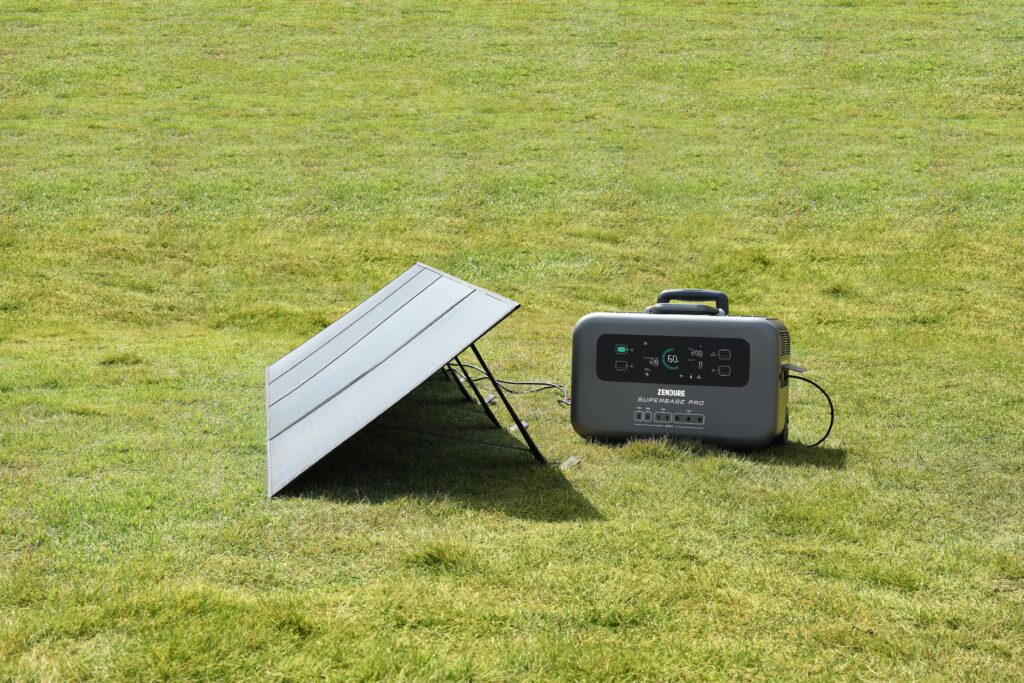Imagine being able to power your entire house using nothing but the energy from the sun. With the revolutionary Solar Generator, this dream could become a reality. This compact and efficient device harnesses the power of solar energy to provide a clean and sustainable source of electricity for all your household needs. Whether it’s powering your appliances, charging your devices, or keeping the lights on during a blackout, the Solar Generator offers an incredible solution that is not only cost-effective but also environmentally friendly. Say goodbye to expensive electricity bills and hello to a greener future with the Solar Generator.

Understanding what a Solar Generator is
Definition of solar generator
A solar generator is a device that converts sunlight into electricity, providing a clean and renewable energy source. It consists of three main components: solar panels, a battery or energy storage system, and an inverter. This portable and efficient system allows you to harness the power of the sun and use it to power various appliances and devices.
Components of a solar generator
- Solar panels: These panels are made up of photovoltaic cells that convert sunlight into electrical energy. They capture the solar radiation and convert it into direct current (DC) electricity.
- Battery or energy storage system: This component stores the excess electricity generated by the solar panels for later use when sunlight is not available or during the night. It ensures a constant and uninterrupted power supply.
- Inverter: The inverter is responsible for converting the direct current (DC) electricity from the solar panels and battery into alternating current (AC) electricity, which is the standard form of electricity used in homes and appliances.
How a Solar Generator Works
The role of solar panels
solar panels play a crucial role in a solar generator by harnessing the power of the sun. The photovoltaic cells within the solar panels absorb sunlight and convert it into direct current (DC) electricity. The more sunlight the panels receive, the more electricity is generated.
Energy storage in solar generator
The excess electricity generated by the solar panels during peak sunlight hours is stored in a battery or energy storage system within the solar generator. This stored energy can be used during times when there is no or limited sunlight available, ensuring a continuous power supply.
Inverter’s role
The inverter is an essential component of a solar generator as it converts the direct current (DC) electricity generated by the solar panels and stored in the battery into alternating current (AC) electricity. AC electricity is the form of electricity used in homes and appliances. The inverter ensures compatibility between the solar generator and your household electrical system.

Determining the Capacity of Solar Generators
How to measure the power output of a solar generator
The power output of a solar generator is measured in watts (W) or kilowatts (kW). To determine the capacity of a solar generator, you need to consider the wattage of the devices and appliances you intend to power. Add up the power consumption (in watts) of all the devices you plan to run simultaneously to get an idea of the solar generator’s capacity you require.
Factors that affect solar generator’s capacity
Several factors can affect the capacity of a solar generator, including the size and wattage of the solar panels, the battery capacity or energy storage system, and the efficiency of the inverter. It’s important to consider these factors when choosing a solar generator to ensure it can meet your power needs.
Can Solar Generators Power Your Entire House?
Typical residential power requirements
The power requirements of a typical residential house can vary depending on its size, energy-efficient appliances, and the number of occupants. On average, a home consumes around 10,000 to 15,000 kilowatt-hours (kWh) of electricity per year. To determine if a solar generator can power your entire house, you need to assess your specific energy needs.
Comparing solar generator’s output with household needs
To determine if a solar generator can power your entire house, compare its power output (in watts or kilowatts) with the total power consumption of your home. It’s important to consider that solar generators typically have a limited capacity compared to the power demands of an entire house. In most cases, solar generators can power essential devices and appliances but may not be sufficient to meet the entire power needs of a house.

Limitations of Solar Generators for Home Use
Potential energy shortages
One limitation of solar generators is the potential for energy shortages. If there is insufficient sunlight to generate electricity for an extended period, the solar generator may not be able to sustain power supply. This can occur during prolonged periods of cloudy weather, nighttime, or in highly shaded areas.
Dependency on weather conditions
Solar generators are dependent on sunlight to generate electricity, making them susceptible to weather conditions. If you live in an area with frequent cloudy or rainy weather, the solar generator’s efficiency and power output may be significantly reduced.
Storage capacity limitations
Another limitation of solar generators is the storage capacity of the battery or energy storage system. If the solar generator’s storage capacity is limited, it may not be able to store enough energy to provide power during extended periods without sunlight. Assessing your energy needs and choosing a solar generator with an appropriate storage capacity is crucial to overcome this limitation.
Connecting a Solar Generator to Your House
Installation process
Connecting a solar generator to your house involves several steps. Firstly, you need to install the solar panels in a suitable location where they can receive maximum sunlight exposure. The panels are typically mounted on rooftops or ground-mounted in areas with unobstructed sunlight. Once the panels are installed, the solar generator is connected to your household electrical system through the inverter.
Placement of solar panels
The placement of solar panels is vital for maximizing their efficiency. They should be positioned to receive direct sunlight throughout the day, avoiding any obstructions such as trees or buildings that may cast shadows. The angle at which the panels are tilted should also be considered to optimize sunlight absorption.
Connecting to home’s power grid
To connect the solar generator to your home’s power grid, it is essential to consult a certified electrician. They will ensure that the solar generator is properly connected, compliant with local regulations, and safely integrated into your existing electrical system. Connecting to the power grid allows you to utilize electricity from the solar generator and also feed any excess energy back into the grid.
Safety Concerns with Solar Generators
Risks of solar generators
While solar generators are a safe and environmentally friendly option, there are some safety concerns to be aware of. The main risks associated with solar generators include electrical shock, fire hazards, and battery malfunctions. It is crucial to follow safety guidelines and take necessary precautions when installing, operating, and maintaining a solar generator.
Safety precautions to take
To ensure safe usage of a solar generator, it is important to adhere to safety precautions. These may include disconnecting the generator from the power source before performing any maintenance, using proper protective gear when working with electrical components, and following manufacturer’s guidelines for installation and operation. Regular inspection and maintenance can also help identify and address any potential safety issues.
Maintenance and Lifespan of Solar Generators
Routine maintenance tasks
Proper maintenance is essential to maximize the lifespan and efficiency of a solar generator. Routine maintenance tasks may include regularly cleaning the solar panels to remove any dirt or debris that may reduce their performance, inspecting the wiring and connections for any signs of damage or wear, and checking the battery’s charge level and overall health.
Expected lifespan of solar generators
The lifespan of a solar generator can vary depending on the quality of its components and the level of maintenance performed. On average, a well-maintained solar generator can last for 20 to 30 years. However, it’s important to note that individual components may have different lifespans. Solar panels typically have a lifespan of 25 to 30 years, while batteries may need to be replaced every 5 to 15 years depending on usage and type.
Common issues and repairs
Common issues that may arise with solar generators include panel or wiring damage, battery deterioration, and inverter malfunctions. If any issues are identified, it is recommended to consult a professional technician or a certified electrician for repairs or replacements. Regular monitoring and addressing any issues promptly can help ensure the optimal performance and longevity of your solar generator.
Choosing the Right Solar Generator for Your Home
Assessing your energy needs
To choose the right solar generator for your home, it’s important to assess your energy needs carefully. Consider the power requirements of the devices and appliances you wish to power, as well as any specific energy demands unique to your household. This will help you determine the necessary capacity and storage requirements for your solar generator.
Comparing solar generator models
There are various solar generator models available in the market, each with its own specifications and features. Compare different models based on their power output, storage capacity, efficiency, and additional features such as built-in outlets or USB ports. Reading reviews and considering customer feedback can also provide insights into the performance and reliability of different models.
Price versus capacity
While the price is an important factor to consider, it should not be the sole determining factor when choosing a solar generator. Balance the price with the capacity and capabilities of the solar generator to ensure it can meet your energy needs effectively. Investing in a high-quality solar generator with the necessary capacity may yield better long-term savings and performance.
Economic Considerations of Solar Generators
Cost comparison with traditional power sources
When considering the economic aspects of solar generators, it is essential to compare the costs with traditional power sources. Solar generators eliminate or reduce the need for reliance on fossil fuels, which can result in significant cost savings in the long run. While the initial investment in a solar generator may be higher, the long-term savings on electricity bills and reduced environmental impact make it an economically viable option.
Tax credits and incentives for solar power
Governments and local authorities often provide tax credits and incentives to promote the use of solar power. These incentives can help offset the initial cost of installing a solar generator and make it a more financially attractive option. Research the tax credits and incentives available in your region to take advantage of potential cost savings.
Long-term savings potential
One of the significant economic advantages of solar generators is their long-term savings potential. By harnessing the power of the sun, you can reduce or eliminate your reliance on traditional power sources. Over time, the savings on electricity bills can offset the initial investment in a solar generator, providing a reliable and cost-effective energy solution for your home.
In conclusion, a solar generator can provide a clean and renewable energy source for your home. Understanding the components, working principles, and limitations of solar generators is essential when considering their usage. By assessing your energy needs, comparing different models, and considering the economic aspects, you can choose the right solar generator that suits your requirements and allows you to enjoy the benefits of sustainable energy.




